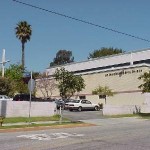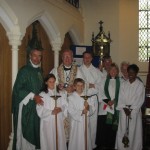 In 2006 we ‘twinned’ with the Episcopal parish of St. Bede in the City and Diocese of Los Angeles. It is the parish that serves the communities of Venice, Playa Vista, Mar Vista, Ocean Park. We also have parishioners from Marina del Rey, Playa del Rey, Westchester, Santa Monica, Culver City & West Los Angeles.
In 2006 we ‘twinned’ with the Episcopal parish of St. Bede in the City and Diocese of Los Angeles. It is the parish that serves the communities of Venice, Playa Vista, Mar Vista, Ocean Park. We also have parishioners from Marina del Rey, Playa del Rey, Westchester, Santa Monica, Culver City & West Los Angeles.
Their priest, Fr. Jim Newman, writes:
‘St. Bede’s is an inclusive Christian community, and we welcome all visitors and newcomers to worship with us at any of our services. St. Bede’s is comprised of about 135 households with about 225 baptized members. The parish is comprised of 1/3 families (married or partnered), 1/3 singles (widowed, divorced or never-married), and 1/3 “church singles” (married or partnered, but the other person not involved in the parish).
involved in the parish).
I am the 3rd Rector of St. Bede’s and has served since 1990. I am also Dean of the West Los Angeles Deanery and a member of the Los Angeles Diocese’s deputation to the General Convention. Ordained to the diaconate in 1978 and the priesthood in 1979 by Bishop Robert Anderson, I was named an honorary Canon of Los Angeles’ Cathedral Center of St. Paul in 2003 by Bishop J. Jon Bruno.
About the Episcopal Church The name “Episcopal” comes from the Greek word “episkopos,” which means “bishop” or “overseer.” The leaders of our church are called “bishops,” and we are called “Episcopalians.”
What do we believe? Episcopalians maintain three sources as critical to understanding God and the world:
The Bible: We believe that God and God’s people speak to us through the Bible and that it contains the wisdom needed for a good life. And most important of all, the Bible proclaims to us the Good News of Jesus Christ. Scripture is sacred and authoritative, but not infallible. We balance what we learn from scripture with traditions and reason.
Our Traditions: This includes the prayer and theological reflection by a multiplicity of voices throughout Church history. We believe that God has continued speaking through the generations and the traditions that have been established through the life of the Church have authority in our lives.
Reason: While reason is commonly understood today to be an aloof, non-emotional consideration of clear ‘facts,’ since the time of 16th Century theologian Richard Hooker, Anglicans have used the term in a more holistic way, entailing both the operations of the mind and the heart. Anglican reason must include a combination of logic, and the subjective, basic sense of ‘rightness’ which each of us posses. Reason, which includes our own personal experience of God and God’s work in the world.
(The Episcopal Church of the United States of America is part of the world-wide Anglican Communion)







Comments are closed, but trackbacks and pingbacks are open.